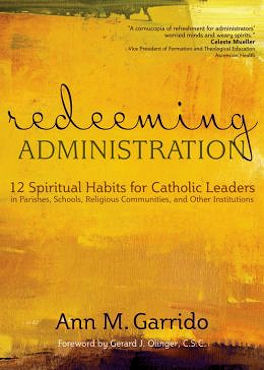
|
Posted October 22, 2013
Book: Redeeming Administration: 12 Spiritual Habits for Catholic Leaders in Parishes, Schools, Religious Communities, and Other Institutions Author: Ann M. Garrido Ave Maria Press. Notre Dame, IN. 2013. Pp. 204 An Excerpt from the Introduction:
In this book, I want to challenge the poor reputation of administration as something that drains the light and life out of good people and reconceive it as a potential spiritual pathway by which good people can become better people --- people distinguished by a certain translucence and aliveness that extend beyond themselves and into institutions they serve. In theological language, I want to argue that administration can be a praxis --- an activity that has the potential to transform not only the lives of others, but also an administration's own life and way of being in the world. I hope to redeem administration by exploring twelve habits that together form the spiritual fabric of this most vital ministry of Christ's Church. An Excerpt from the Book: Humor "There is no use trying," said Alice. "One can't believe impossible things." "I dare say you haven't much practice," said the Queen "When I was your age, I always did it for half an hour a day. Why sometimes, I've believed as many as six impossible things before breakfast." Alice's Adventures in Wonderland. We all love to work with lighthearted people --- people who can laugh and tell a good joke, who make the office a fun place to be. Yet, I struggled with whether to include humor as a chapter in this book. Certainly a good sense of humor is desirable, but the premise of the text has been to identify qualities that administration grows within us, and administration suffers a popular preconception of making people less funny, not more. Most would suspect that if an administrator happens to be fun to be around, it is an accident of their personality, not that their job somehow nurtured joviality. Yet, when I've done workshops with administrators around the nation, one of the qualities that they most frequently mention as a quality administration has cultivated within them is a sense of humor. I have come to realize that, as a group, we seem to know something about administration that the rest of the world does not, something we are good at keeping a secret: administrators find lots to laugh about. Why? Believe it or not, the fields of philosophy, psychology, and biology have all devoted significant attention to the topic of humor and what makes us laugh. Most theories revolve around an experience of the absurd --- something strikes us as incongruous with how things normally function in our world. Humans can have a variety of emotions around something not seeming quite right --- anger, confusion, and so forth --- but if the incongruity is perceived as benign, they find it humorous. A man charges us with a sword, and we are frightened. A rabbit charges us with a toothpick, and we snicker. Currently, scientists tend to distinguish between two main types of humor: deprecation and elevation. In the first type, humor is a manifestation of the innate power struggle that exists in any human community. Plato actually described humor as a form of aggression. We take incongruities in human behavior and laugh at them as a way of taking pleasure in our own superiority. Sometimes this form of humor can be outright cruel --- schoolyard teasing, the laughter of gossip --- but many times it is very subtle and innocuous. We wouldn't find the Three Stooges or Charlie Chaplin movies funny if depreciating humor were not built into our genetic makeup. In the humor of elevation, the absurdity that life poses becomes a sort of riddle. When we are able to make sense of it, we enjoy a certain "aha" moment and feel the pleasure that comes from having worked something out for ourselves, a tiny burst of intellectual energy. Many humorous situations are a combination of deprecation and elevation. I suspect the reason so many administrators describe administration as increasing their sense of humor is due to the perception that administration has placed them in an increased number of absurd situations. There is much in institutional life that seems perfectly clear to us as administrators but foggy to others. And in reverse, there is much that must appear logical to others but seems poppycock to us. Like Alice in fictional Wonderland, most of us have been asked to believe a lot of "impossible things" in the course of our work, some days as many as six of them before we've managed to rinse our coffee mug. I cannot tell you the number of forms that I believe I had designed to be simple and straightforward but that came back to me a jumbled mess. At the same time, I would have a hard time counting the policies that I've been asked to implement that --- from where I sit --- seem utterly nonsensical. Whereas early in the ministry I might have gotten myself worked up or worried about the absurdity of things, experience has taught me that most things are more benign than what they appear and hence merit laughter more than angst. In the words of Thomas More, "Happy is the person who can distinguish between a rock and a mountain; it avoids so many inconveniences." Table of Contents: 1. Breadth of Vision: Angela Merici 2. Generativity: Jordan of Saxony 3. Trust: Louise de Martillac 4. Agage: Richard of Chichester 5. Integrity: Bruno 6. Humility: Martha 7. Courage: Ambrose 8. Reflection: Joseph Mukasa Balikuddembe 9. Humor: Thomas More 10. Forgiveness: Mary MacKillop 11. Embrace Death: Rose Philippine Duchesne 12. Hope: Gregory the Great |
|
